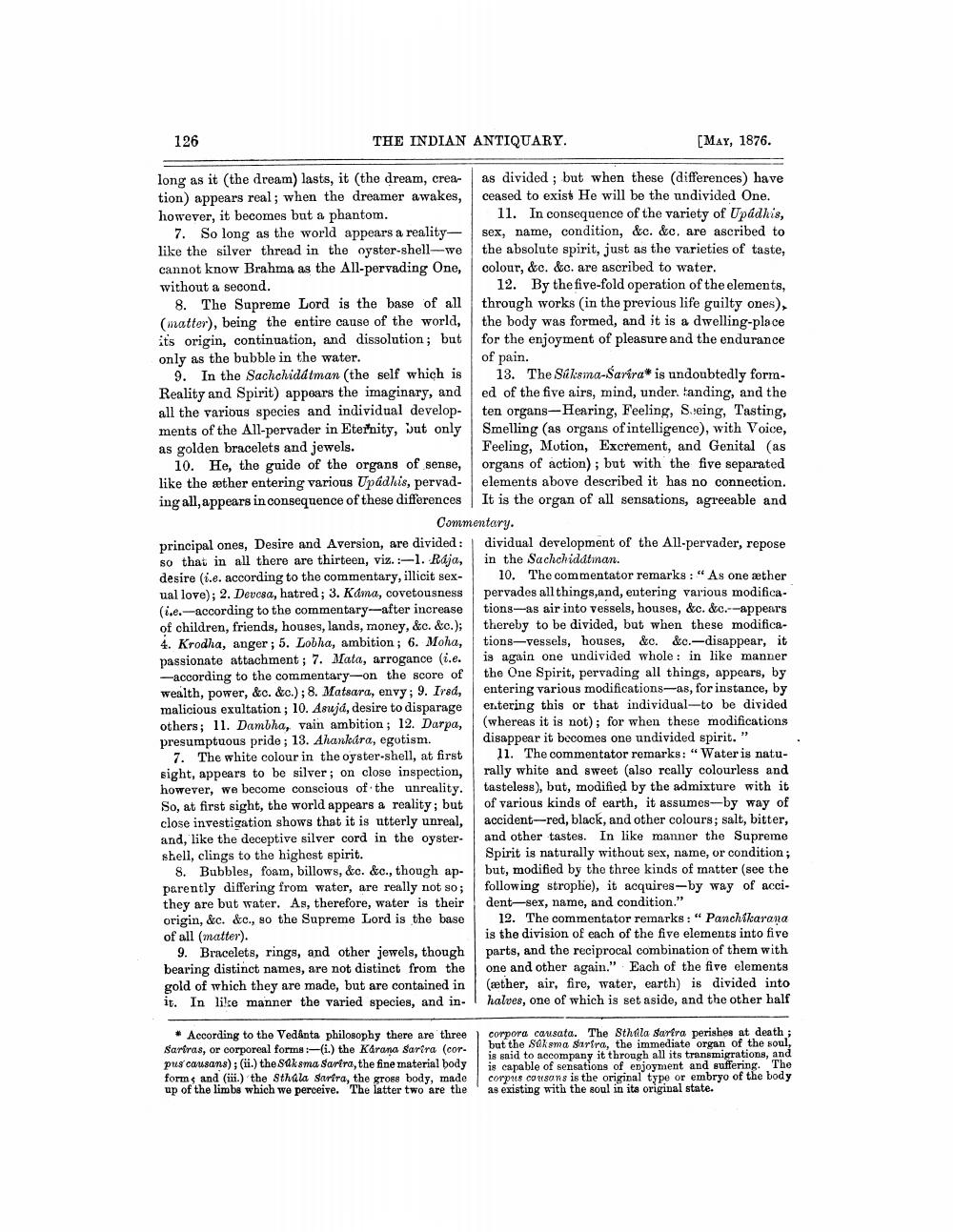________________
126
THE INDIAN ANTIQUARY.
long as it (the dream) lasts, it (the dream, creation) appears real; when the dreamer awakes, however, it becomes but a phantom.
7. So long as the world appears a reality like the silver thread in the oyster-shell-we cannot know Brahma as the All-pervading One, without a second.
8. The Supreme Lord is the base of all (matter), being the entire cause of the world, its origin, continuation, and dissolution; but only as the bubble in the water.
12. By the five-fold operation of the elements, through works (in the previous life guilty ones), the body was formed, and it is a dwelling-place for the enjoyment of pleasure and the endurance of pain.
13. The Súksma-Sarira is undoubtedly formed of the five airs, mind, under. tanding, and the ten organs-Hearing, Feeling, Seeing, Tasting, Smelling (as organs of intelligence), with Voice, Feeling, Motion, Excrement, and Genital (as organs of action); but with the five separated elements above described it has no connection. It is the organ of all sensations, agreeable and Commentary.
9. In the Sachchidátman (the self which is Reality and Spirit) appears the imaginary, and all the various species and individual developments of the All-pervader in Eternity, but only as golden bracelets and jewels.
10. He, the guide of the organs of sense, like the æther entering various Upádhis, pervading all, appears in consequence of these differences
principal ones, Desire and Aversion, are divided: so that in all there are thirteen, viz. :-1. Rája, desire (i.e. according to the commentary, illicit sexual love); 2. Devesa, hatred; 3. Káma, covetousness (i.e.-according to the commentary-after increase of children, friends, houses, lands, money, &c. &c.); 4. Krodha, anger; 5. Lobha, ambition; 6. Moha, passionate attachment; 7. Mata, arrogance (i.e. -according to the commentary-on the score of wealth, power, &c. &c.); 8. Matsara, envy; 9. Ired, malicious exultation; 10. Asujá, desire to disparage others; 11. Dambha, vain ambition; 12. Darpa, presumptuous pride; 13. Ahankára, egotism.
7. The white colour in the oyster-shell, at first sight, appears to be silver; on close inspection, however, we become conscious of the unreality. So, at first sight, the world appears a reality; but close investigation shows that it is utterly unreal, and, like the deceptive silver cord in the oystershell, clings to the highest spirit.
8. Bubbles, foam, billows, &c. &c., though apparently differing from water, are really not so; they are but water. As, therefore, water is their origin, &c. &c., so the Supreme Lord is the base of all (matter).
[MAY, 1876.
as divided; but when these (differences) have ceased to exist He will be the undivided One.
9. Bracelets, rings, and other jewels, though bearing distinct names, are not distinct from the gold of which they are made, but are contained in it. In like manner the varied species, and in
According to the Vedanta philosophy there are three Sartras, or corporeal forms:-(i.) the Kárana Sartra (corpus causans); (ii.) the Saksma Sartra, the fine material body forms and (iii) the Sthala Sartra, the gross body, made up of the limbs which we perceive. The latter two are the
11. In consequence of the variety of Upádhis, sex, name, condition, &c. &c. are ascribed to the absolute spirit, just as the varieties of taste, colour, &c. &c. are ascribed to water.
dividual development of the All-pervader, repose in the Sachchidátman.
10. The commentator remarks: "As one æther pervades all things,and, entering various modifications-as air into vessels, houses, &c. &c.--appears thereby to be divided, but when these modifications-vessels, houses, &c. &c.-disappear, it is again one undivided whole: in like manner the One Spirit, pervading all things, appears, by entering various modifications-as, for instance, by entering this or that individual-to be divided (whereas it is not); for when these modifications disappear it becomes one undivided spirit."
11. The commentator remarks: "Water is naturally white and sweet (also really colourless and tasteless), but, modified by the admixture with it of various kinds of earth, it assumes-by way of accident-red, black, and other colours; salt, bitter, and other tastes. In like manner the Supreme Spirit is naturally without sex, name, or condition; but, modified by the three kinds of matter (see the following strophe), it acquires-by way of accident-sex, name, and condition."
12. The commentator remarks: "Panchikarana is the division of each of the five elements into five parts, and the reciprocal combination of them with one and other again." Each of the five elements (æther, air, fire, water, earth) is divided into halves, one of which is set aside, and the other half
corpora causata. The Sthala Sartra perishes at death; but the Saksma Sartra, the immediate organ of the soul, is said to accompany it through all its transmigrations, and is capable of sensations of enjoyment and suffering. The corpus cousons is the original type or embryo of the body as existing with the soul in its original state.




